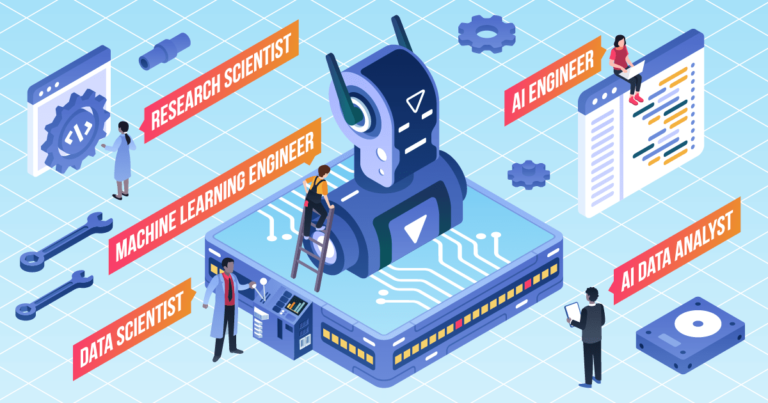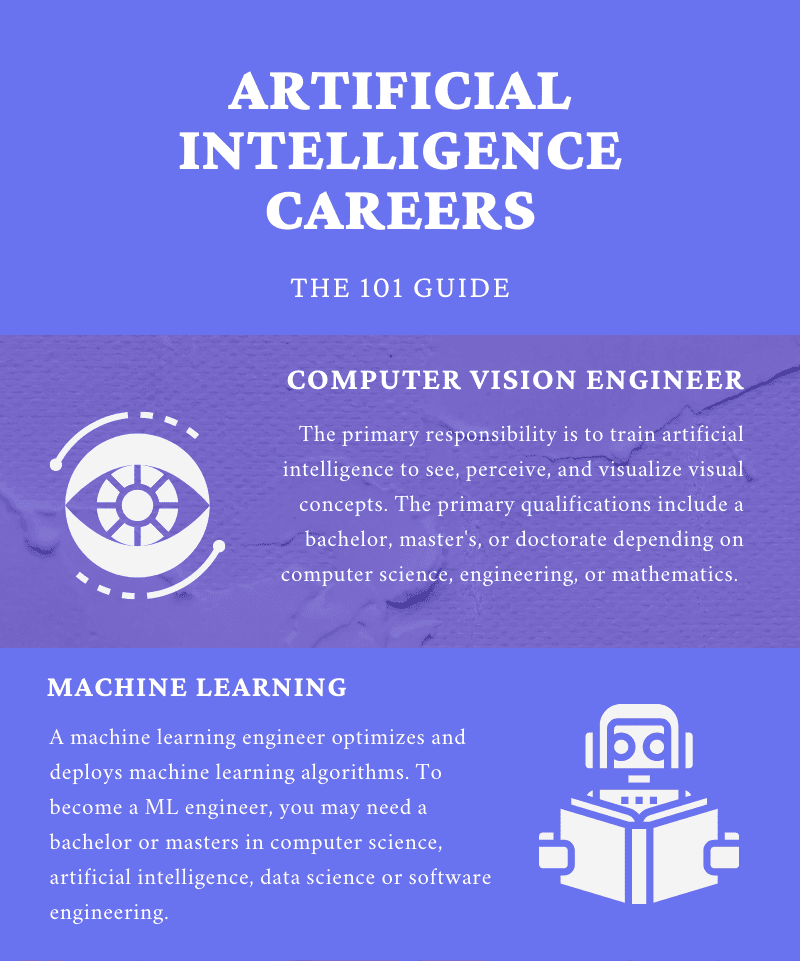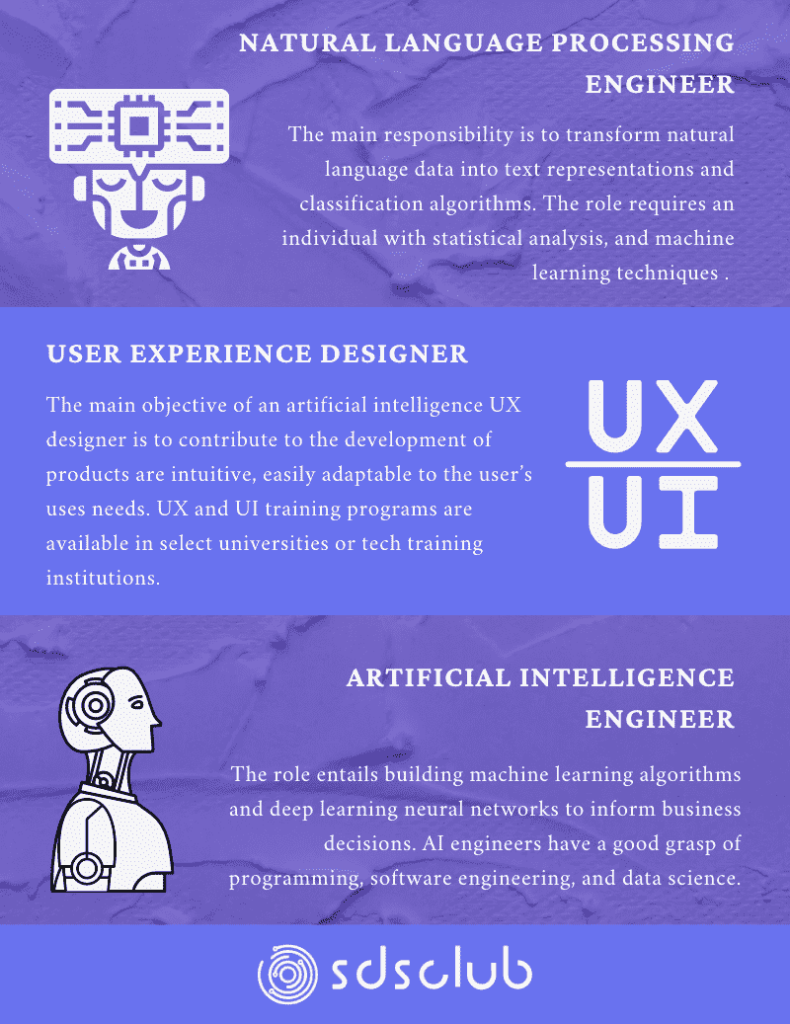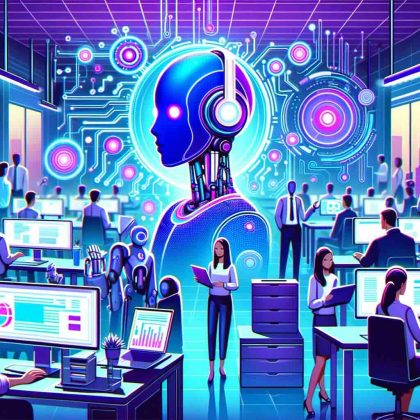Artificial Intelligence Careers: The 101 Guide

In case you missed it, the future is already here with us. COVID-19 ushered the Fourth Industrial Revolution and, with it, a renewed appreciation for data-driven technologies and artificial intelligence careers.
COVID containment measures, in particular lockdowns, forced the world to accelerate automation and digitization efforts. A survey by Mckinsey on the future of work after COVID indicates that two-thirds of executives are increasing investments in automation and AI either ‘somewhat or significantly.’
Further, a World Economic Forum report shows that multiple governments and companies prioritize upskilling and reskilling to prepare the workforce for their fourth industrial revolution.
Undoubtedly, the AI disruption will mean that work in some sectors of the economy will be obsolete. However, new and expanded opportunities for those looking for how to get into AI to achieve positive social impact and personal development are continuously emerging.
Robots, self-driving cars, automated disease diagnostic systems are examples of AI in this modern world. With time, AI will pervade every aspect of our lives to shape the way we live and work. And this growth will be underscored by an increase in AI career opportunities.
Therefore, if you’re seeking to build a career in artificial intelligence, this guide is for you.
Skills Needed for Careers in Artificial Intelligence
If you’re interested in any of the careers in AI, here are some of the training and skills you’ll need:
- Information Technology: With IT training, you’ll be ready to develop artificial systems with varying capacities. IT, combined with a math background such as probability, algebra, calculus, logic, and algorithms, equips you to develop ML technological systems.
- Robotics Engineering: Robotics is an interdisciplinary field of technology that equips you to build machines that simulate human actions (robots). To become a robotics engineer, you will need a bachelor’s degree from an accredited robotic engineering program. However, employers also accept people with mechanical or electrical engineering, computer science, software engineering, or mathematics.
- Cognitive Science theory: It is an interdisciplinary study of the mind and its processes. A cognitive science degree or major gives you an understanding of the nervous system and how it presents information to the mind. It includes aspects like attention, memory, language, reasoning, and emotion. The knowledge of cognitive science is heavily applied when building artificial intelligence.
- Computer Science: It involves studying computers and computing, and the knowledge is useful for building machines capable of simulating human intelligence.
- Software Engineering: You’ll learn programming languages essential for designing and developing software used to simulate intelligent processes such as reasoning and understanding different forms of information.
- Bayesian networking or graphical modeling, including neural nets: Bayesian or graphical modeling, is the technology behind prediction, including time series prediction, diagnostics, and decision-making capacity evident in artificial intelligence.
For entry level artificial intelligence jobs, you require at least a bachelor’s degree, while supervision or leadership roles require master’s or doctoral degrees.
You could also major in a specific AI area such as engineering, health informatics, computer science, user experience design, or information technology.
Besides the technical training, successful AI developers also need to demonstrate analytical thinking and provide cost-effective, forward-thinking technological solutions that give an employer a competitive advantage. Excellent written and spoken communication is essential to communicate complex technical concepts without jargon and for the benefit of a non-technical audience.
With any of the above academic qualifications and soft skills, you are well equipped for any lucrative artificial intelligence job opportunities.
Examples of Careers in Artificial Intelligence
- Computer Vision Engineer – The vision engineer’s primary responsibility is to train artificial intelligence to perceive and visualize visual concepts. The primary qualifications include a bachelor’s, master’s, or doctorate in computer science, engineering, or mathematics. To become a computer vision engineer, you must also have experience in machine learning and the development of computer vision algorithms. PayScale indicates that the average salary of a computer vision engineer at $ 116,511.
You will also be required to have excellent software engineering skills and be able to write using the main languages – C++/Python. You should have the ability to learn new languages as a project may demand. You will also be required to know automatic differentiation frameworks such as Tensorflow or PyTorch.
- Software Engineer – You are responsible for designing and creating engineering specs for software programs. The job requires that you work closely with a Quality Assurance Hardware Engineer.
A software engineer’s minimum requirement is a bachelor’s degree in computer science, computer engineering, or related discipline. You should also have experience and knowledge of the main programming languages such as C# and C++, Java, and Visual Basic. The average salary of a software engineer is $ 86,855.
- System Engineer – In addition to what the software engineer does, a system engineer may also be responsible for specifying, building, and maintaining technical infrastructure. The infrastructure is the environment used to build, test, and deliver Software as a Service (SaaS) solutions. The average salary is $ 80,658.

In the event of a service disruption, the system engineer is called upon to undertake cause analysis and fix the problem. The education required to break into system engineer is similar to that of a software engineer.
- User Experience Experts – There are multiple careers in the user experience artificial intelligence niche, such as Usability Analysts, Information Architects, Interactive Designer, or User Experience Designer. The salary of a user experience expert is $ 80,000.
An artificial intelligence designer’s main objective is to contribute to intuitive, easily adaptable products that meet the user’s needs. You’re likely to find UX and UI training programs in select universities or tech training institutions.
- Machine Learning Engineer – A machine learning engineer optimizes and deploys machine learning algorithms to automate predictive models. Meaning, ML engineers’ software applies results from past operations in future processes for a greater accuracy level. According to PayScale, the average salary of an ML Engineer is $112,805.
To become an ML engineer, you may need a bachelor’s or masters in computer science, artificial intelligence, data science, or software engineering.
- Data Scientists – Also called Machine Learning Researchers, data scientists work with data to build machine learning models. They clean and interpret data and build models using a combination of machine learning algorithms and data. The average salary for a data modeling expert is $ 81,152.
- Big Data Engineer/Architect – The data engineer is responsible for conceptualizing data flow within an enterprise data management framework. The data engineer will use the framework developed by the architect to design the data governance framework. The average salary for data scientists is $ 111,675.
A degree in computer science, computer engineering, or a related field will equip you for a data architect or engineer role.
- Computer Science and AI researcher – The primary responsibility in this role is to pioneer helpful research that applies computing to improve the way people play, learn and work. The average salary is $ 125,520.
If you’re wondering how to become an AI researcher, a computer science degree is an excellent place to start.
- Natural Language Processing (NLP) Engineer – The NLP engineer’s primary responsibility is to transform natural language data into text representations and classification algorithms. The role requires an individual with statistical analysis and machine learning techniques typically acquired through a degree in computer science, mathematics, physics, or similar disciplines. The average salary is $107,886.
- Business Intelligence Developer – Is responsible for researching and designing solutions that equip the company to make data-driven decisions. The BI Developer will create data visualization, dashboards, and data modeling tools to achieve the objective. Average salary $80,275.
To become a business developer, you may need a degree in computer science, information systems, business administration, engineering, data science, economics, or a related discipline.

- AI Engineer – The role entails building machine learning algorithms and deep learning neural networks. AI engineers have a good grasp of programming, software engineering, and data science. The average salary is $ 125,520.
A degree or masters in IT, Computer science, finance, statistics, data science are suitable for those interested in a career as an artificial intelligence engineer.
How to Get into Artificial Intelligence
So, how do you get into AI? Here are four steps to follow:
- Research on Possible Disciplines of AI
There are over five subdomains of artificial intelligence. As a first step, identify all of them and determine the set of skills you’ll need to specialize in each. Artificial intelligence has five disciplines: automation, machine learning, machine or computer vision, and robotics.
- Choose Appropriate Courses/ Educational Programs
Once you have the subdomains, you can now choose an area of specialization based on your interest. Then, pursue a learning path that will equip you for the job market in your area of specialization.
- Build a Portfolio
Showcase your artificial intelligence skills by building a portfolio. The biggest mistake beginners make when trying to get into the market is to create a portfolio with tutorial-based projects. Portfolios based on online tutorials are not robust and are often disregarded.
Instead of seeking out tutorials, find unique problems you can solve using your skills. There are multiple online repositories of machine learning problems you can find, such as the UCI machine learning repository.
You can download the datasets provided in the repository and use them to practice. Try and find other repositories that have datasets you can use to showcase different aspects of your skills.
- Apply for Internships and Beginner Job Positions
Next, apply for internship and beginner positions. Internships are a great way to enter the job market because you’ll get to understand how classwork applies in real-world scenarios. Internships will also position you to secure well-paying jobs after graduation.
To get jobs and internship opportunities, make use of LinkedIn. For instance, you can search for artificial intelligence jobs within your locality, and you will get a result of current job opportunities available. Also, you can find a jobs board that posts jobs specific to artificial intelligence, such as the AI jobs board.
How to Boost Your AI Skills
Whether you’re just starting and are looking for ideas on how to get a job in AI, or you’re already in the space, boosting your AI skills is very important. There are numerous online training opportunities providing certifications based on the artificial intelligence disciplines.
The credible certifications have been designed by industry leaders and are useful as evidence of technical competency as you navigate the job market. Certifications convince hiring managers of the holder’s credibility and capacity to meet industry performance requirements.
Final Thoughts
You can pursue artificial intelligence careers using academic majors such as computer science, health informatics, engineering, mathematics, or information technology. And since the industry is constantly evolving, it is essential to keep abreast with industry best practices, emerging tools, and techniques by signing up for short credible certifications.
Lastly, it is possible to transition to an artificial intelligence career from a non-tech background, especially if you’re ready to invest the time and effort required to understand AI concepts. Whereas formal education is essential and valuable, it is not the only way. The AI sector is very pragmatic, and success is based on demonstratable skills and not just formal education.
Therefore, you’re a self-learner, you can secure a career in AI by taking up credible courses.
Sign up for our newsletter for more information and industry news on artificial intelligence and so much more.



